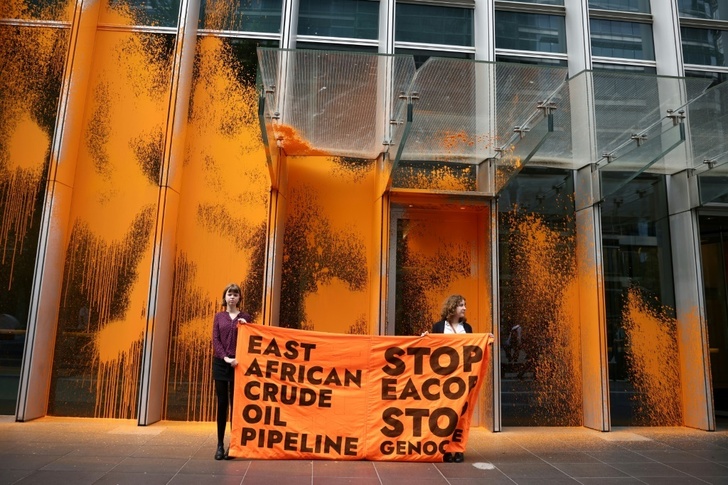Twenty-six Ugandans on Tuesday sued French oil giant TotalEnergies in Paris for reparations over alleged human rights violations at its massive megaprojects in the country, as climate protesters targeted its UK headquarters.
Joined by five Ugandan and French aid groups, people from the affected communities say the energy firm caused "serious harm", especially to their rights to land and food.
"What we're asking of the tribunal is to recognise Total's civil responsibility and sentence the company to compensate the people affected by violations," Friends of the Earth France spokeswoman Juliette Renaud said.
At the heart of their complaint at the Paris court are two vast TotalEnergies developments: the Tilenga exploration of 419 oil wells, one-third of them in Uganda's largest national park Murchison Falls, and EACOP, a 1,500-kilometre (930-mile) pipeline bringing crude oil to the Tanzanian coast through several protected nature reserves.
EACOP was also the target Tuesday of London climate campaigners who sprayed paint on the facade and lobby of TotalEnergies' UK headquarters in the Canary Wharf financial district.
Police said 27 people were arrested in the demonstration by the Just Stop Oil group against both the pipeline's effect on local communities and its projected greenhouse emissions of 379 million tonnes of carbon.
TotalEnergies said in a statement that it "fully respects the right to demonstrate and freedom of expression, but deplores all forms of violence, whether verbal, physical or material".
- 'Food shortages' -
On the ground, people affected by the work "have been deprived of free use of their land for three or four years, in violation of their property rights", the French and Ugandan associations said in a statement.
This "deprived them of their means of subsistence" and led to "serious food shortages" for some families -- with only some receiving in-kind compensation, while others were offered financial terms "far short" of what was needed.
Some villages suffered flooding caused by construction at the Tilenga project's oil treatment plant, the associations alleged.
Additionally, "several plaintiffs suffered threats, harassment and arrest simply for daring to criticise oil projects in Uganda and Tanzania and defend the rights of affected communities," they added.
Two activists, Jelousy Mugisha and Fred Mwesigwa, travelled to France for a 2019 case that aimed to require Total to watch out for potential rights violations.
"When they returned to Uganda one was arrested at the airport and the other attacked at his home 10 days later," the NGOs said.
A third, Maxwell Athura, told a Paris press conference Tuesday that he had faced "threats and intrusions at his home" and was "arbitrarily arrested twice in 2022".
"By falling short in its duty of vigilance, Total caused serious harm to the plaintiffs, especially to their rights to land and food. They are therefore requesting the company be ordered to compensate them," the statement continued.
- Company 'welcomes debate' -
"TotalEnergies welcomes a debate on the facts in court," a company spokeswoman told AFP.
She added that the company "believes its plan for surveillance (of possible rights violations) is in line with legal requirements" and "implemented effectively" by its subsidiaries in Tanzania and Uganda.
But the associations say that more than 118,000 people have had their land wholly or partially expropriated because of the two TotalEnergies projects, including through sales allegedly agreed under intimidation.
"It is unacceptable that foreign oil companies continue to make extraordinary profits while communities affected by their projects in Uganda are harassed, displaced, poorly compensated and living in abject poverty on their own land," said Frank Muramuzi, executive director of Friends of the Earth's Ugandan branch and local NGO NAPE.
The associations say TotalEnergies should have been aware of potential serious rights violations linked to its Ugandan plans, but the firm "did not act when warned they existed and did not implement corrective measures once the human rights violations occurred".
There were "no steps addressing population displacements, limits to people's access to their means of subsistence or threats against human rights defenders in Total's plans from 2018 to 2023," they allege.
Friends of the Earth and four Ugandan associations failed in a 2019 bid before a French court to force TotalEnergies to halt Tilenga and EACOP.
lp/tgb/sjw/kjm
© Agence France-Presse
Your content is great. However, if any of the content contained herein violates any rights of yours, including those of copyright, please contact us immediately by e-mail at media[@]kissrpr.com.
Source: Story.KISSPR.com

